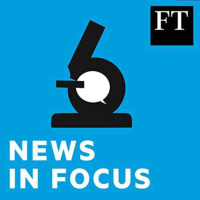Synopsis
Interviews with Economists about their New Books
Episodes
-
Benjamin Ho, "Why Trust Matters: An Economist's Guide to the Ties That Bind Us" (Columbia UP, 2021)
26/08/2021 Duration: 59minDo you trust corporations? Do you trust politicians? Do you trust the science? Does anyone trust anyone anymore? In Why Trust Matters: An Economist's Guide to the Ties That Bind Us (Columbia UP, 2021), Professor Ben Ho reveals the surprising importance of trust to how we understand our day-to-day economic lives. Starting with the earliest societies and proceeding through the evolution of the modern economy, he explores its role across an astonishing range of institutions and practices, surveying and synthesizing research across economics, political science, psychology, and other disciplines, and presents his own cutting-edge behavioral economics research on the role of apologies in restoring trust. He argues that we trust far more than we may realize, and that mostly this is a good thing. Check out the New Yorker's review of the book. Ben Ho is an associate professor at Vassar College. Ho applies economic tools like game theory and experimental design to topics like apologies, trust, identity, inequality and
-
Ella L. J. Bell Smith and Stella M. Nkomo, "Our Separate Ways: Black and White Women and the Struggle for Professional Identity" (Harvard Business Press, 2021)
26/08/2021 Duration: 39minElla L. J. Bell Smith and Stella M. Nkomo, Our Separate Ways: Black and White Women and the Struggle for Professional Identity (Harvard Business Press, 2021) Ella Bell Smith is a professor of business administration at the Tuck School of Business. She’s also the founder and president of ASCENT: Leading Multicultural Women to the Top. Stella M. Nkomo is a professor in the Department of Human Resource Management at the University of Pretoria. She was the founding president of the Africa Academy of Management. A “glass ceiling” that holds women back from attaining the top levels of management within a company is a familiar term. But how about a “cement wall”? That’s how these two authors describe the struggle that confronts women of color and often African-American women particularly as they try to rise through the ranks. What black women must deal with is often a lack of both visibility and authority. This episode explores why it is that so little progress has been made so far in the 21st century. While white f
-
Victoria Basualdo et al., "Big Business and Dictatorships in Latin America: A Transnational History of Profits and Repression" (Palgrave Macmillan, 2020)
25/08/2021 Duration: 50minOn this episode of the Economic and Business History channel, I spoke with Dr. Victoria Basualdo and Dr. Marcelo Bucheli about their new edited book. Big Business and Dictatorships in Latin America: A Transnational History of Profits and Repression (Palgrave Macmillan, 2020) is an edited volume that studies the relationship between big business and the Latin American dictatorial regimes during the Cold War. The first section provides a general background about the contemporary history of business corporations and dictatorships in the twentieth century at the international level. The second section comprises chapters that analyze five national cases (Argentina, Brazil, Chile, Uruguay, and Peru), as well as a comparative analysis of the banking sector in the Southern Cone (Argentina, Brazil, Chile, and Uruguay). The third section presents six case studies of large companies in Argentina, Brazil, Chile, Colombia, and Central America. This book is crucial reading because it provides the first comprehensive analys
-
Rohit Khanna, "Misunderstanding Health: Making Sense of America's Broken Health Care System" (Johns Hopkins UP, 2021)
24/08/2021 Duration: 36minWith technological advances and information sharing so prevalent, health care should be more transparent and easier to access than ever before. So why does it seem like everything about it―from pricing, drug development, and the emergence of new diseases to the intricacies of biologic and precision medicine therapies―is becoming more complex, not less? Rohit Khanna's Misunderstanding Health: Making Sense of America's Broken Health Care System (Johns Hopkins UP, 2021) examines some of today's most revealing health care trends while imploring us to look at these issues with alacrity, humor, and vigilance. Over the course of eighteen short, engaging chapters, Khanna explains • how unexamined beliefs can endanger patients, drive cost, and increase bureaucracy • the "Dr. Google" effect on the ways that we seek (or eschew) care • why our health care costs more than in any other country • the unintended consequences of using rating sites like Yelp • what we can learn about health care from hurricanes • how social me
-
Michael Dennis, "The Full Employment Horizon in 20th-Century America: The Movement for Economic Democracy" (Bloomsbury, 2021)
23/08/2021 Duration: 53minOne of the unfulfilled goals of the American left during the 1930s was that of an economy in which every American would enjoy the opportunity for gainful employment. In The Full Employment Horizon in 20th-Century America: The Movement for Economic Democracy (Bloomsbury, 2021), Michael Dennis describes the origins of the movement, the efforts made to achieve it, and the factors that frustrated its realization. Dennis traces its beginnings to a progressive critique of industrial capitalism in the 1920s, which warned of the growing disparity between rising productivity and stagnant wages. During the Great Depression, groups from across the political left took up the cause of full employment, campaigning for legislation to ensure that jobs could be had by all. When President Franklin Roosevelt called in 1944 for a right to a job as part of his Economic Bill of Rights, it seemed as though full employment was close to realization, only for its prospects to be dashed in the late 1940s by opposition from business, So
-
Michael Friendly and Howard Wainer, "A History of Data Visualization and Graphic Communication" (Harvard UP, 2021)
23/08/2021 Duration: 57minStatistical graphing was born in the seventeenth century as a scientific tool, but it quickly escaped all disciplinary bounds. Today graphics are ubiquitous in daily life. In their just-published A History of Data Visualization and Graphic Communication (Harvard UP, 2021), Michael Friendly and Howard Wainer detail the history of graphs and tables, how they help solve problems, and even changed the way we think. You'll never look at an excel chart the same way again.... Daniel Peris is Senior Vice President at Federated Hermes in Pittsburgh. He can be reached at DanielxPeris@gmail.com or via Twitter @HistoryInvestor. His History and Investing blog and Keep Calm & Carry On Investing podcast are at https://strategicdividendinves... Learn more about your ad choices. Visit megaphone.fm/adchoices Support our show by becoming a premium member! https://newbooksnetwork.supportingcast.fm/economics
-
Jonathan Brill, "Rogue Waves: Future-Proof Your Business to Survive and Profit from Radical Change" (McGraw-Hill Education, 2021)
19/08/2021 Duration: 38minToday I talked to Jonathan Brill about his new book Rogue Waves: Future-Proof Your Business to Survive and Profit from Radical Change (McGraw-Hill Education, 2021) There are ten big trends that Brill identifies as disrupting business now and into the future. Each is a wave of change onto self, but the intersection of many of them contributes to forming monster waves that threaten to drown companies not open to rapid, successive adaptations. What are the avoidable causes of failure? What kind of executive will do best? (Hint: it’s not those too full of pride.) From automation and artificial intelligence to Sherlock Holmes and abductive reasoning, this episode has a little of everything, as befits a world in turmoil. Hard to resist a book with this wonderful quote from Anais Nin: “We don’t see things as they are, we see them as we are.” It’s human fallacies, especially the confirmation bias, that so often limits our ability to adapt. Jonathan Brill is the former Global Futurist and Research Director for HP, a b
-
Emily Oster, "The Family Firm: A Data-Driven Guide to Better Decision Making in the Early School Years" (Penguin, 2021)
18/08/2021 Duration: 51minIn The Family Firm: A Data-Driven Guide to Better Decision Making in the Early School Years (Penguin, 2021), Brown University professor of economics and mom of two Emily Oster offers a classic business school framework for data-driven parents to think more deliberately about the key issues of the elementary years: school, health, extracurricular activities, and more. In our interview, she walks me through a “case study” exercise on the decision of whether to delay kindergarten entry, discusses what (if anything) differs between the approach in her approach and what a family therapist might recommend, and reminds us that when making family decisions, we should always be careful to ask “What are our dreams and what are our kids’ dreams?” and remember these may not be the same. Host Peter Lorentzen is an Associate Professor in the Department of Economics at the University of San Francisco. His researches governance and decision-making within the Chinese Communist Party but does not recommend that parents apply a
-
Margarita M. Balmaceda, "Russian Energy Chains: The Remaking of Technopolitics from Siberia to Ukraine to the European Union" (Wilson Center, 2021)
13/08/2021 Duration: 49minMargarita Balmaceda’s Russian Energy Chains: The Remaking of Technopolitics from Siberia to Ukraine to the European Union (Columbia University Press, 2021) is a meticulous exploration of a complex system of energy supplies involving Russia, Ukraine, and the European Union. While originating in Russia, energy supplies, as the author asserts, undergo changes and transformations when being delivered to various destinations. What do these changes inform about the nature of both energy resources and power? Offering an insightful framework in which the two concepts can be understood, Russian Energy Chains complicates the issue of energy supplies that are inextricable from the dynamics of power relations on the interstate level. In addition to acute commentaries on the current role and status of Russia in the energy market, Margarita Balmaceda offers references to various time periods to illustrate how politically and geographically entangled energy systems are. Russian Energy Chains provides a detailed account of t
-
Hannah Wohl, "Bound by Creativity: How Contemporary Art Is Created and Judged" (U Chicago Press, 2021)
13/08/2021 Duration: 01h22minWhat is creativity? While our traditional view of creative work might lead us to think of artists as solitary visionaries, the creative process is profoundly influenced by social interactions even when artists work alone. Hannah Wohl speaks with Pierre d’Alancaisez about Bound by Creativity: How Contemporary Art Is Created and Judged (U Chicago Press, 2021), her ethnographic study of the New York contemporary art scene that reveals how artists develop conceptions of their distinctive creative visions through experimentation and social interactions and how aesthetic judgment evolves between artist studios, galleries, art fairs, and collectors’ houses. We mention Paula Cooper Gallery and the work of artists Lucky DeBellevue and Gina Beavers. The Armory Show takes place in NY in early September 2021. Hannah Wohl is an assistant professor in sociology at University of California, Santa Barbara. Pierre d’Alancaisez is a contemporary art curator, cultural strategist, researcher. Sometime scientist, financial servic
-
Alice Wiemers, "Village Work: Development and Rural Statecraft in Twentieth-Century Ghana" (Ohio UP, 2021)
12/08/2021 Duration: 58minMost development histories focus on large-scale projects and multi-year plans. But how would we understand development differently if we chose a different starting point? In Village Work: Development and Rural Statecraft in Twentieth-Century Ghana (Ohio UP, 2021), Alice Wiemers exchanges the center for the periphery. Writing outwards from Kpasenpke, a village in northern Ghana, Wiemers shows how the daily labor of rural people, local officials and family networks have all shaped a practice of rural statecraft centered on developmentalism. By insisting on the specificity of the hinterland and interchangeability of its so-called “developers”, Village Work proposes a new framework for approaching Ghana’s twentieth century. Elisa Prosperetti is a Visiting Assistant Professor in African history at Mount Holyoke College. Her research focuses on the connected histories of education and development in postcolonial West Africa. Contact her at: www.elisaprosperetti.net. Learn more about your ad choices. Visit megaphone
-
Mai Hassan, "Regime Threats and State Solutions: Bureaucratic Loyalty and Embeddedness in Kenya" (Cambridge UP, 2020)
11/08/2021 Duration: 59minWhen trying to understand how to help countries escape poverty, economists initially focused on macro topics like inflation, government deficits, trade balances, and capital inflows. Later there was a shift in focus to institutions, looking at whether and how competitive elections, strong legal systems, and other features facilitated investment and growth. More recently micro policy has become a new focus, with experimentalists conducting randomized trials to figure out whether or how much specific policies like de-worming, malaria bednets, or clean cooking stoves helped or why they might fail. But regardless of whether a country is a democracy or dictatorship and regardless of whether the policies have been evaluated by a randomized controlled trial, someone has to carry them out. How are government personnel selected, assigned, and incentivized? How does this affect policy implementation? In her book, Regime Threats and State Solutions: Bureaucratic Loyalty and Embeddedness in Kenya, Professor Mai Hassan ex
-
Hanno Jentzsch, "Harvesting State Support: Institutional Change and Local Agency in Japanese Agriculture" (U Toronto Press, 2021)
11/08/2021 Duration: 40minAgriculture has been among the toughest political battlegrounds in postwar Japan and represents an ideal case study in institutional stability and change. Inefficient land use and a rapidly aging workforce have long been undermining the economic viability of the agricultural sector. Yet vested interests in the small-scale, part-time agricultural production structure have obstructed major reforms. Change has instead occurred in more subtle ways. Since the mid-1990s, a gradual reform process has dismantled some of the core pillars of the postwar agricultural support and protection regime. Harvesting State Support analyzes this process by shifting the analytical focus to the local level. In Harvesting State Support: Institutional Change and Local Agency in Japanese Agriculture (U Toronto Press, 2021), Hanno Jentzsch investigates how local actors, including farmers, local governments, and local agricultural cooperatives, have translated abstract policies into local practice. Showing how local variants are constru
-
Leo Casey, "The Teacher Insurgency: A Strategic and Organizing Perspective" (Harvard Education Press, 2020)
04/08/2021 Duration: 01h07minIn The Teacher Insurgency: A Strategic and Organizing Perspective (Harvard Education Press, 2020), Leo Casey addresses how the unexpected wave of recent teacher strikes has had a dramatic impact on American public education, teacher unions, and the larger labor movement. Casey explains how this uprising was not only born out of opposition to government policies that underfunded public schools and deprofessionalized teaching, but was also rooted in deep-seated changes in the economic climate, social movements, and, most importantly, educational politics. With an eye to maintaining the momentum of the insurgency, the author examines four key strategic questions that have arisen from the strikes: the relationship of mobilization to organizing; the relationship between protests and direct action; the conditions under which teacher strikes are most likely to be successful; and the importance of "bargaining for the common good." More broadly, Casey examines how to organize teachers for collective action, focusing o
-
Shelby Grossman, "The Politics of Order in Informal Markets: How the State Shapes Private Governance" (Cambridge UP, 2021)
04/08/2021 Duration: 48minProperty rights are important for economic exchange, but many governments don't protect them. Private market organizations can fill this gap by providing an institutional structure to enforce agreements, but with this power comes the ability to extort group members. Under what circumstances, then, will private organizations provide a stable environment for economic activity? Based on market case studies and a representative survey of traders in Lagos, Nigeria, this book argues that threats from the government can force an association to behave in ways that promote trade. The findings challenge the conventional wisdom that private good governance in developing countries thrives when the government keeps its hands off private group affairs. Instead, the author argues, leaders among traders behave in ways that promote trade primarily because of the threat of government intrusion. Shelby Grossman is a research scholar at the Stanford Internet Observatory. Dr. Grossman's primary research interests are in comparati
-
Andrew W. Lo and Stephen R. Foerster, "In Pursuit of the Perfect Portfolio: The Stories, Voices, and Key Insights of the Pioneers Who Shaped the Way We Invest" (Princeton UP, 2021)
02/08/2021 Duration: 01h01minIs there an ideal portfolio of investment assets, one that perfectly balances risk and reward? In Pursuit of the Perfect Portfolio (Princeton UP, 2021) examines this question by profiling and interviewing ten of the most prominent figures in the finance world—Jack Bogle, Charley Ellis, Gene Fama, Marty Leibowitz, Harry Markowitz, Bob Merton, Myron Scholes, Bill Sharpe, Bob Shiller, and Jeremy Siegel. We learn about the personal and intellectual journeys of these luminaries—which include six Nobel Laureates and a trailblazer in mutual funds—and their most innovative contributions. In the process, we come to understand how the science of modern investing came to be. Each of these finance greats discusses their idea of a perfect portfolio, offering invaluable insights to today’s investors. Inspiring such monikers as the Bond Guru, Wall Street’s Wisest Man, and the Wizard of Wharton, these pioneers of investment management provide candid perspectives, both expected and surprising, on a vast array of investment to
-
Jennifer Pan, "Welfare for Autocrats: How Social Assistance in China Cares for Its Rulers" (Oxford UP, 2020)
29/07/2021 Duration: 01h52sDevelopment economists have been doing intensive research in recent years on conditional cash transfer programs as a tool to help get people out of poverty. Meanwhile in the US there has been a lot of talk about Universal Basic Income as a remedy for inequality and social disclocations. On paper, China’s Minimum Livelihood Guarantee, or Dibao, sounds a lot like Universal Basic Income. Jennifer Pan shows that this tool of poverty alleviation has instead been turned into a tool of surveillance and oppression. Ultimately, this focus on “stability” may backfire. Pan’s book Welfare for Autocrats: How Social Assistance in China Cares for Its Rulers (Oxford UP, 2020) offers insights gleaned from a remarkable combination of in-person field interviews, surveys, online field experiments, and data generated from automated analyses of massive numbers of government documents and social media posts. Jennifer Pan is an Assistant Professor of Communication, and an Assistant Professor, by courtesy, of Political Science and So
-
Massimo Rostagno et al., "Monetary Policy in Times of Crisis: A Tale of Two Decades of the European Central Bank" (Oxford UP, 2021)
28/07/2021 Duration: 49minIn July 2021, nine summers after its then president saved the euro with three choice words (“whatever it takes”), the European Central Bank published the results of a thoroughgoing review of its strategy. A policy framework built for times when inflation posed a modest upside challenge had coped – but only just – with successive financial, sovereign-debt, banking and health crises that threatened chronically weak inflation at best and deflation at worst. Essential to the review was research conducted to mark the 20th anniversary of the ECB in 2019 and now updated and published as a book: Monetary Policy in Times of Crisis: A Tale of Two Decades of the European Central Bank (Oxford UP, 2021) by Massimo Rostagno, Carlo Altavilla, Giacomo Carboni, Wolfgang Lemke, Roberto Motto, Arthur Saint Guilhem and Jonathan Yiangou. This exhaustive analytical history concludes that the ECB operated two policy regimes – one from 1999 to 2012 and a second crisis-informed strategy until the narrative ends before the onset of th
-
David Chard, "When Colleges Close: Leading in a Time of Crisis" (Johns Hopkins UP, 2020)
26/07/2021 Duration: 01h34minDavid Chard, the President of Wheelock College in Boston, MA, discusses the process of merging Wheelock successfully into Boston University to become the BU Wheelock College of Education and Human Development. His book, When Colleges Close: Leading in a Time of Crisis (Johns Hopkins University Press, 2020), written with Wheelock’s VPAA Mary Churchill, provides the most detailed guide available on each step involved in merging a struggling small college into a large university in a way that preserve and amplified its mission and impact. Chard shares what led them to write the book so soon after completing this painful process, and many additional insights about what goes into a successful merger. David Finegold is the president of Chatham University. Learn more about your ad choices. Visit megaphone.fm/adchoices Support our show by becoming a premium member! https://newbooksnetwork.supportingcast.fm/economics
-
Lorenzo Fusaro, "Crises and Hegemonic Transitions: From Gramsci's Quaderni to the Contemporary World Economy" (Haymarket Books, 2020)
26/07/2021 Duration: 01h03minGramsci’s concept of hegemony is often invoked, but usually as a means of cultural critique and analysis. However, my guest Lorenzo Fusaro argues in his recent book Crises and Hegemonic Transitions: From Gramsci's Quaderni to the Contemporary World Economy (Haymarket Books, 2020) that Gramsci’s work is permeated by Marx’s economic critique and his theories of value. Split into two parts, the book is both a critical rereading of Gramsci, followed by a rereading of the last century of economic and political developments. The first half of the book involves a careful rereading of key concepts in Gramsci’s Prison Notebooks, rethinking concepts such as hegemony as being more closely related to the base, instead of simply being superstructural description. Hegemony is not above and beyond economic dynamics and antagonisms, but emerges from them and changes alongside them. This allows for a broadening of the theory conceptually, and also allows him to apply it to international relations, instead of being confined to














